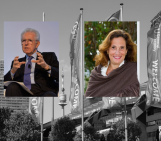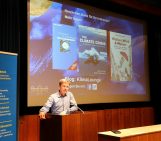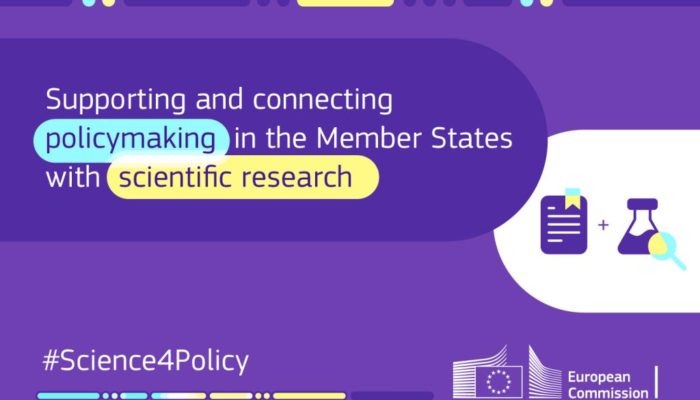
On 25 October, The European Commission published a Staff Working Document that aims to help Member States build capacity to use scientific knowledge more effectively in their policymaking processes. This month’s GeoPolicy Blog post provides a summary of the Staff Working Document that outlines key science for policy challenges and the EU instruments, resources and policy frameworks that can help Member States overcome them. Kristian Krieger and Lorenzo Melchor, members of the JRC Knowledge for Policy (Concepts and Methods) Unit, and Alessandro Allegra, Policy Assistant to the Deputy Director-General for Research & Innovation, also supported this month’s blog post by providing insights into its creation and use.
Today’s policy issues are complex and the policy environment in which they’re made is becoming more demanding. Clear, contextualised, and timely scientific evidence can support policymakers in identifying the underlying issue, understanding their policy options, and subsequently creating evidence-informed policies that deliver positive results for their citizens. However, despite the benefits of evidence-informed policymaking, effectively integrating science into the policymaking process is still a challenge.
While there are already initiatives that strengthen evidence-informed policymaking at the EU level (including the EU’s Better Regulation Guidelines and Toolbox), a recent survey conducted by the Joint Research Centre of the European Commission (JRC) found many areas in which national science for policy ecosystems could be improved. About 70% of the experts surveyed agreed or strongly agreed that the science for policy ecosystem of their country was fragmented with the lack of coordination potentially leading to duplication, contradictions, and an undermining of public trust. This is becoming increasingly clear to policymakers working within EU policy institutions, including Joanna Drake, Deputy Director-General for the European Commission’s Research and innovation,
Supporting and connecting policymaking in the Member States with scientific research
To address these issues, the European Commission, through the Directorates-General Joint Research Centre (JRC) and Research and Innovation (RTD), with the support of Directorate-General for Structural Reform Support (DG REFORM), has published the Staff Working Document, Supporting and connecting policymaking in the Member States with scientific research which highlights how Member States can build capacity to use scientific knowledge more effectively in policymaking. The Staff Working Document outlines the importance of evidence-informed policymaking, current challenges, already existing science for policy processes, and methods of strengthening science advisory mechanisms within EU Member States. Not only is this document a useful tool for policymakers but a signal to Europe’s scientific community that their expertise is valued and needed by policymakers. The document speaks to policymakers in government, parliaments and public administration, and scientists, whether working in universities, academies, or public research institutes. It encourages policymakers to recognise the importance of science – something that COVID-19, the climate crisis, and the current energy cost crises clearly help to convey. But more than that, it outlines how research, scientific expertise, and teaching can immensely benefit end-users, in this case: policymakers and citizens. In communicating this, the document demonstrates that the science and policy communities (and those working between them) are aware of the challenges and are making steps toward more effective science-advice strategies and mechanisms.
JRC analyst Kristian Krieger summarised the key outputs of the Staff Working Document in this concise thread,
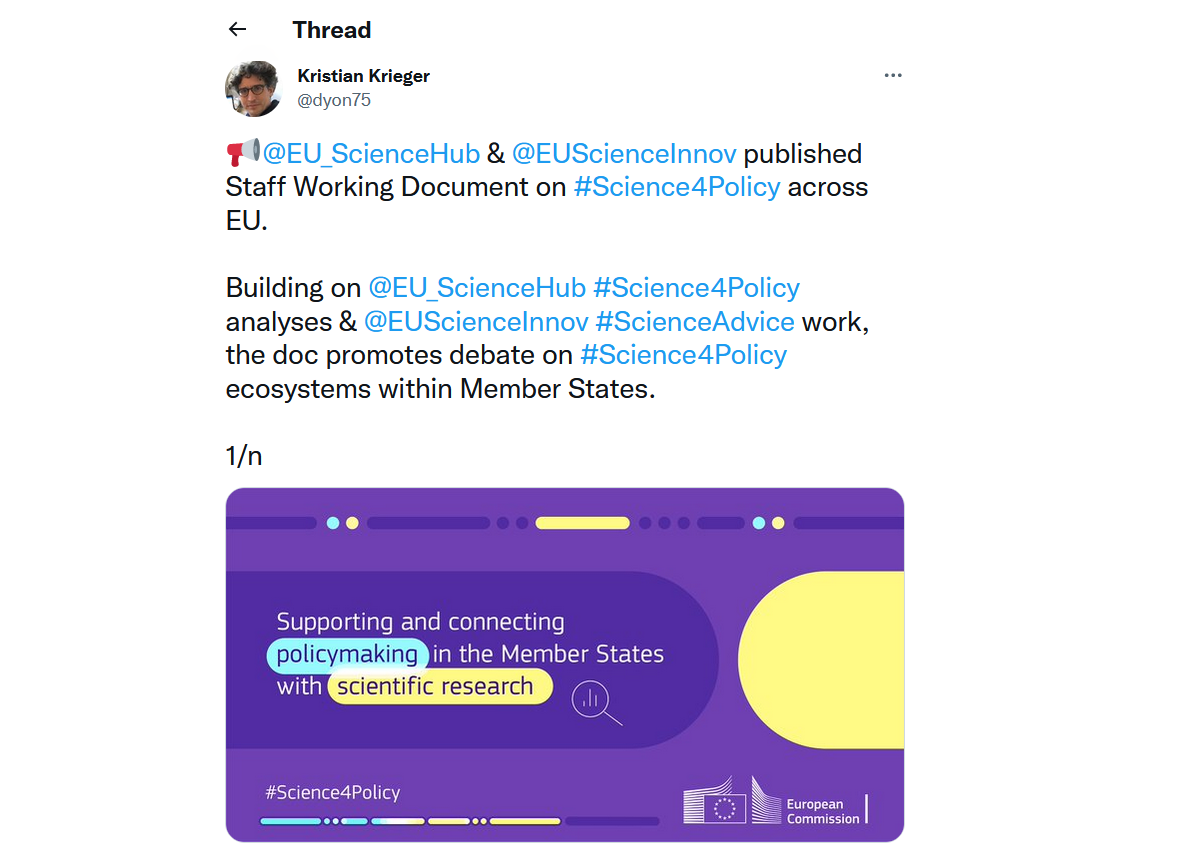
Tweet thread from Kristian Krieger, JRC Policy Analyst, on the Staff Working Document’s key elements
Why now?
Momentum on science for policy has gradually been building in Europe over the last decade with more and more mechanisms and processes being established to promote the integration of science into policymaking processes. The important role of science is increasingly recognised and formalised. The JRC has been laying the ground work for this Staff Working Document and its future outcomes by hosting a survey and 14 virtual workshops on the science for policy ecosystems of different Member States, creating a Science for Policy Competence Framework for both researchers and policymakers, establishing a Knowledge4Policy Platform to bridge the science-policy gap, and publishing their Science for Policy Handbook and training professional science for policy workshop leaders to build the capacities of individual scientists. This Staff Working Document builds on these activities, and the lessons learned during the COVID-19 pandemic.
Strategies for building robust science for policy ecosystems
The Staff Working Document not only outlines challenges that Member States face when establishing a robust science for policy ecosystem, but also capacities that could be developed to help overcome these. Three key areas were highlighted:
1. Building connections and relationships within and between national science for policy ecosystems
Scientists and policymakers generally work in two distinct communities with different time frames, incentives, language, and professional culture. Establishing strong and sustainable connections is essential to managing expectations but can be a time consuming process for individual scientists who have many other responsibilities and tasks. The Staff Working Document highlights the important role of Boundary Organisations, formal bodies that facilitate two-way dialogues and the transfer of contextualized information, in providing this connection.
2. Developing the professional competences needed at the science-policy interface
Both policymakers and researchers need to develop competences to communicate and understand where and how science can be used in the policymaking process more effectively. These competences can be developed through a professional training or through exchanges, fellowships, placements, and pairing schemes that promote mutual learning between scientists and policymakers.
3. Strengthen principles and processes of good governance in using science for policymaking
For effective collaboration, it is vital that both the science and policy communities understand their respective responsibilities. Science should not be used as a sole justification for any political choice as there are always multiple components to any policy decision. The Staff Working Document acknowledges this and emphasizes the importance of understanding the limits of science for policy and addressing them through governance principles and processes.
Next steps
The Staff Working document provides an overview of effective science for policy initiatives that can be built upon, the current science for policy challenges, and methods of overcoming these. It’s the beginning of a process that will encourage EU Member States to develop stronger, interconnected national science for policy ecosystems. To support this, it outlines several mechanisms that EU Member States can engage with to establish more effective evidence-informed policymaking on a national-level going forward.
With assistance from the JRC and the Organization for Economic Co-operation and Development (OECD), the European Commission DG REFORM’s Technical Support Instrument will help seven EU Member States (Greece, Belgium, the Czech Republic, Estonia, Latvia, Lithuania, and the Netherlands) to build their capacity in evidence-informed policymaking. The project, which was launched during an event on 8 November 2022, will support Member States in implementing public administration reforms and increasing their capacity to create evidence-informed policymaking. This Tweet thread from JRC analyst Lorenzo Melchor summarises the key outputs of this event. The institutional changes and new initiatives developed through this project will depend on the specific system and needs of each individual Member State. Stephen Quest, Director-General of the Joint Research Centre, also tweeted about the project,
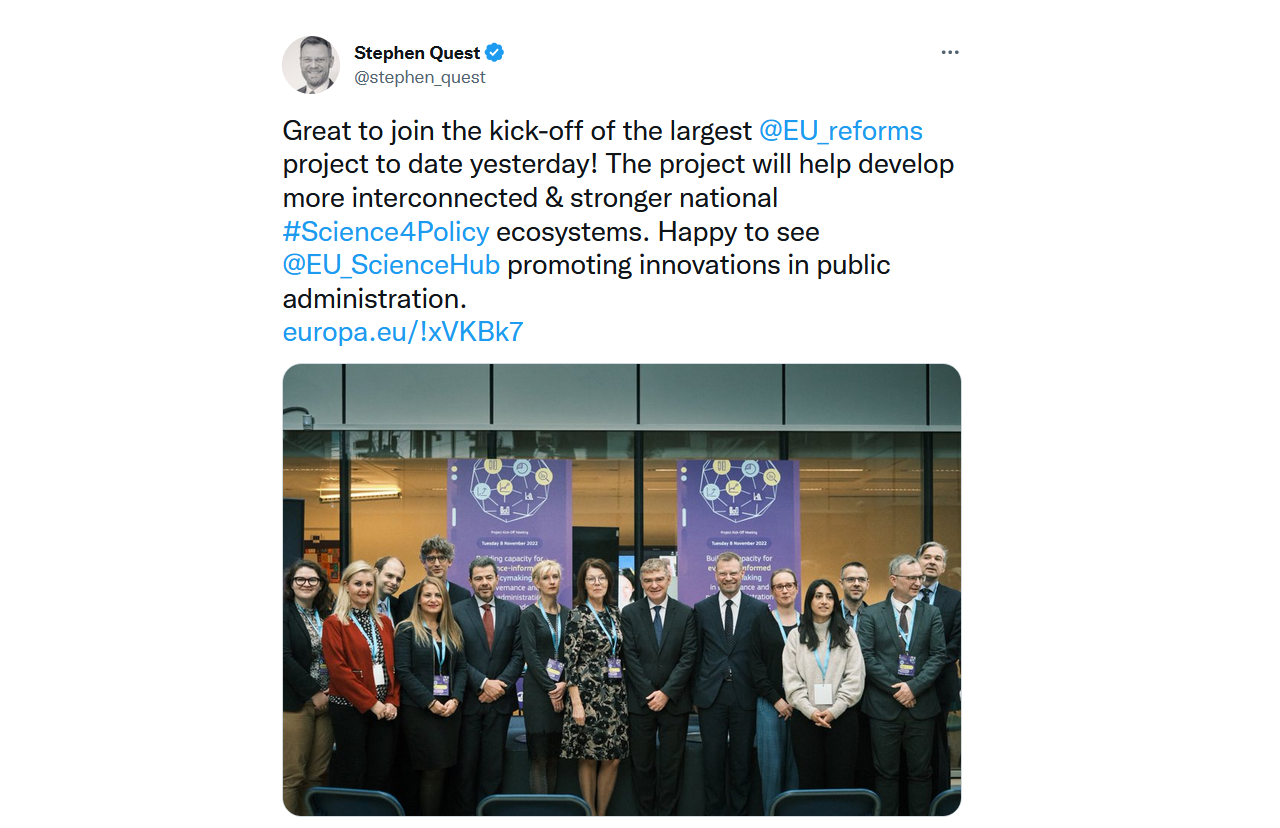
Tweet by Stephen Quest, Director-General, Joint Research Centre.
The Staff Working Document also encourages Member States to consider participating in additional initiatives through the Technical Support Instrument and using the Horizon Policy Support Facility. It also recommends that Member States develop fellowship schemes and placement opportunities for scientists in public administrations as well as initiatives that create knowledge exchange opportunities such as innovation camps and pairing schemes. Furthermore, it promotes the use of clear guidelines to national scientific and policy communities to manage expectations, differentiate responsibilities, and inspire scientists to act as honest brokers rather than issue advocates.
We will face unprecedented challenges in the coming years, with climate, economic, technological and geopolitical challenges evolving in an intertwined manner that policymakers will need input from scientific communities to solve. However, to effectively integrate science into the policymaking process, we need to build strong support systems and services. The Staff Working Document is an exciting step in accelerating this across Europe, with capacity building processes centered on science for policy.
Thanks to Kristian Krieger, Lorenzo Melchor, and Alessandro Allegra their input on this month’s GeoPolicy blog post!


